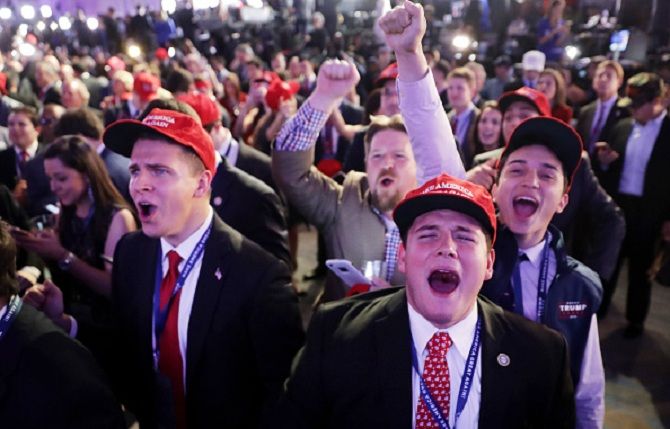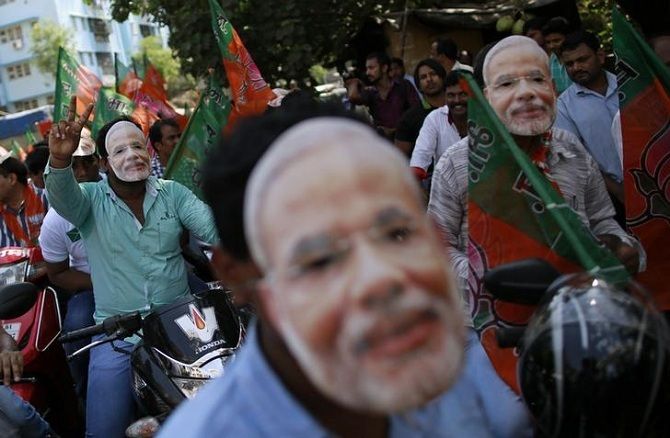The narrative in America after Donald Trump's victory sounds like the questions and debates that took place in India after May 2014.
Were both electoral results all about jobs and economic anxiety?
Mihir S Sharma doubts it.

How often in history has left-wing populism has been more successful than right-wing populism when the two are in open conflict?
Photograph: Chip Somodevilla/Getty Images
In the aftermath of Hillary Clinton's defeat, an ugly and unpleasant impulse has taken hold of many American liberals.
We are now being told that Donald Trump's victory -- and his unexpected surge among the 'white working class' in previously Democratic states -- is because the Clinton campaign, and liberals more generally, focused too much on questions of identity and empowerment.
The white working class in the Rust Belt of America cares only about jobs, we're told, and a party that works for gay marriage and protecting African-Americans from police brutality will merely alienate them.
Right off the block this argument makes little sense.
If you're a member of the working class, white or otherwise, you couldn't possibly have looked at the two platforms on offer and decided rationally that Trump's would be better for your pocketbook.
This argument also has to deal with the fact that Trump's vote did not depend on income -- the crucial predictors of being a Trump voter were race and education.
And the survey questions that most closely correlate with the probability of voting Trump are not about economics, but about questions of identity and majoritarianism.
But that's not the point that these liberals want to hammer home.
How can people still be racist in America? Many of them voted for Barack Obama, after all. Yet that's not how racism works at all.
Racists might easily vote for an African American if they think he's 'one of the good ones,' or that it would 'stop people talking about racism all the time.' They might easily vote for anyone -- a woman, an ethnic minority -- with 'better' economics, if the other candidate on the ballot was, like Mitt Romney or John McCain, steering clear of appeals to white identity.
And then when you suddenly have, for the first time in your lifetime, the white nationalist's ideal candidate on the ballot, your previous voting history, your economic interests, and so on, become irrelevant.
You will frame it, perhaps, as a desire for restoration, as an aspiration towards greatness -- but you're voting for majoritarianism.
When a majority votes like a minority, victories happen.
Liberals and left-wingers in the US are even more divided today, I suspect, than they were during the closely contested primary between Clinton and Bernie Sanders. And, as with all intellectual currents in the US, this divide will spread worldwide.
Should liberals in Europe seek to compromise with the nationalism that is rearing its ugly head across the continent?
Should they blame themselves, and see it as a natural consequence of their willingness to welcome immigrants, their willingness to dissolve sovereignty into the European Union?
Should they, therefore, reverse course on their achievements of the past years and decades, and compete with the right to create a Fortress Europe, with newly vibrant nationalist-ethnic politics and sharper borders within and without?
The worst part of this process, whether in America or in Europe, is that it effectively shifts the blame for racism away from racists to 'market forces' or 'neo-liberalism' or some such McGuffin.
What becomes wrong is not the hate or the discrimination; it's the systems that have been created to protect the victims of hate or discrimination -- and the victims themselves, who have foolishly come to assume that the left will protect them.
I just wonder how often, in history, left-wing populism has been more successful than right-wing populism when the two are in open conflict.
In fact, attempts to co-opt right-wing rhetoric and to seek allies among those who prioritise identity and hate are generally doomed to fail. They will dissolve and compromise the left far more than they will succeed in eviscerating the right.
And worst of all, it will allow many right-of-centre leaders space to capture the middle ground, as Theresa May seeks to do in Britain.
Once that ground has been ceded to the right, it takes a generation to win it back.
I am deeply amused, in fact, by those on the left whining that such majoritarian compromising is necessary to 'win' -- when their greatest, indeed, sole attack on the previous generation of compromisers, like Clinton, was that they were so soulless that they compromised to win.

In any case, this is all very familiar. It sounds like the questions and debates that took place in this country after May 2014, when centrists and liberals were faced with the scale of Narendra Modi's victory in India's north and west.
It was clear then that some groups counted on as part of a broad liberal social coalition had instead voted for Modi.
Was this all about jobs and economic anxiety, as many argue in the case of Trump, and many argued in the case of Modi? I doubt it.
As much of it -- more -- was about pride.
About majoritarian pride, in particular, and anger at a liberal State that prioritised its duty to the least privileged.
Again: When a majority votes like a minority, victories happen.
And if liberals are resigned to treating a majority like they are a minority, they will continue to lose.
They will lose elections, and they will lose themselves.











